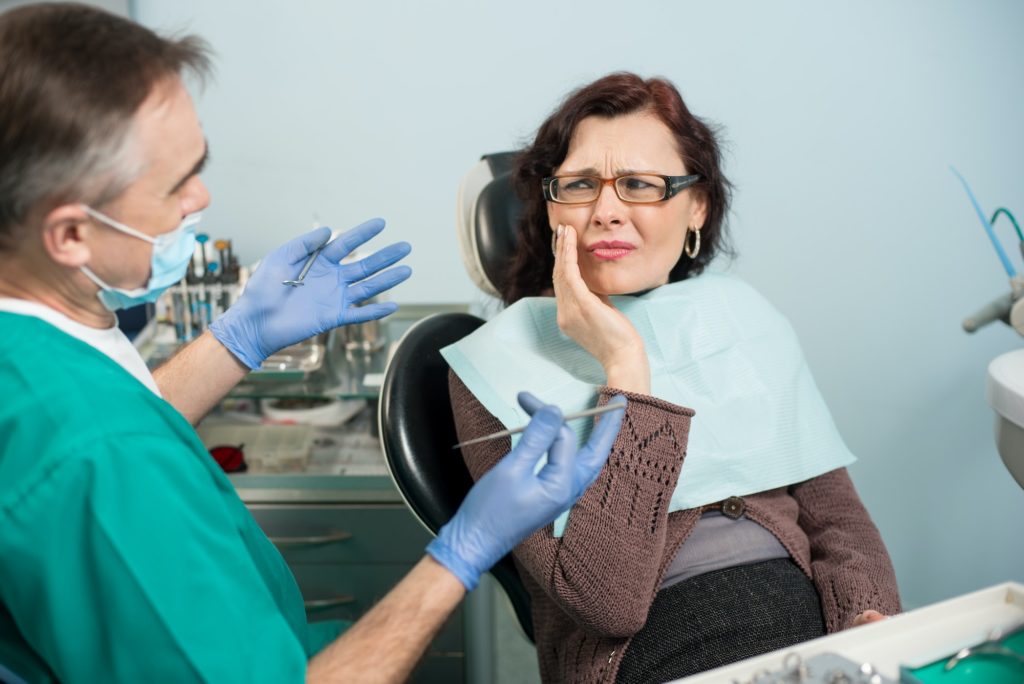Do You Need An Emergency Dentist?

Find the information and protocol necessary to classify your dental issue as a dental emergency, find emergency dental help near you, and determine whether you should see an emergency dentist or go to your local hospital emergency room.
Table of Contents
Do You Need An Emergency Dentist?
Before you make the call, you should know what is actually classified as a dental emergency. Emergency Dentists generally work on any dental problem that requires immediate attention to stop bleeding, help with severe and intolerable pain, save a tooth that may otherwise be lost, and address serious infections that can potentially be life-threatening.
If you fall into that category, and need an emergency dentist near you we know it’s because you’re in desperate need of relief for your dental pain, discomfort, and distress. Emergency dentists make time to attend to patients in immediate need as quickly as possible. The sooner you see an emergency dentist, the sooner you’ll feel better. We’re always prepared to assist patients who are searching for an emergency dentist in their local area whether its Connecticut or Rhode Island.
What Are Common Dental Emergencies and How to React to Them?
1. What to do if your tooth is knocked out
When an adult tooth is knocked out, it’s best to try putting it back in place and go to your dentist immediately or an emergency dentist that is available. Never try to re-insert a baby tooth yourself—it’s best to take your child to their dentist immediately. If you are having trouble putting your adult tooth back into position after it has been knocked out, submerge it in milk and contact your local dental practice or an emergency dentist after hours.
2. What to do if you lose a dental filling
If you’ve lost your dental filling, contact your dentist to make an appointment. This is not as urgent as a tooth that’s been knocked out, so you may not be able to be seen and treated immediately. If you cannot get treatment for your lost filling immediately, you should keep the area missing the filling extra clean to prevent bacteria from damaging the exposed tissue.
3. What to do if your dental crown falls out
- Step 1: Contact your dentist immediately.
- Step 2: Rinse off your crown and clean your mouth.
- Step 3: Protect your exposed tooth until it’s treated.
- Step 4: Get your dental crown reattached or replaced.
4. What to do if you chip your tooth
If your tooth has been broken, chipped, or fractured, see your dentist immediately or at their first available time. Your tooth is left vulnerable and could be damaged further or become infected—in some cases causing you to end up losing your tooth.
What to Have in Your DIY Home + Travel Dental Emergency Kit Checklist?
If your emergency happens at home, while you’re on a trip, or in your own vehicle, you can be prepared with an emergency kit made up of these items. Use this checklist to make sure you’re always prepared.
- Latex gloves
- Dental Floss
- Gauze
- Tweezers
- Cotton Swabs
- Iodized Salt – ½ teaspoon of salt in 8 ounces of warm water will help to ease or ward off infection
- Plastic Sandwich Baggies
- Topical Pain Medication (like Orajel or DenTek)
- Oral Pain Medications
- Dental Crown Repair Kit
Now that your prepared to handle an emergency dental visit should one arise, and you know what criteria constitute a dental emergency there’s one thing left to do—take this information and calmly deal with any dental emergency knowing we’re here to help you!
Emergency Dentist FAQ
Emergency dentists are crucial in providing immediate dental care when unexpected dental issues arise. Their benefits include rapid relief from severe toothaches, infections, and injuries, helping to alleviate pain and discomfort promptly. They offer accessible services during evenings, weekends, and holidays, ensuring that dental emergencies are addressed promptly.
Emergency dentists can also prevent dental problems from worsening, potentially saving teeth that might otherwise be lost if left untreated. Their quick response and specialized skills provide peace of mind for individuals in distressing dental situations.
Emergency dentists are trained to handle a wide range of urgent dental issues, including severe toothaches, broken or chipped teeth, knocked-out teeth, dental abscesses, loose or lost dental fillings or crowns, and soft tissue injuries in the mouth. They can diagnose and treat dental infections, provide immediate pain relief, perform tooth extractions when necessary, and offer temporary fixes to stabilize dental issues until further treatment can be scheduled. Emergency dentists are equipped to handle a variety of dental emergencies and ensure that patients receive the necessary care to alleviate pain and prevent complications.
While some dental emergencies are unexpected and unavoidable, many can be prevented through proactive oral hygiene and regular dental check-ups. Maintaining good oral health practices, such as brushing and flossing regularly, wearing protective gear during physical activities, avoiding excessive consumption of hard or sticky foods, and refraining from using teeth as tools (e.g., opening packages), can significantly reduce the risk of dental emergencies.
Additionally, consistent dental check-ups allow dentists to identify and address potential issues before they escalate into emergencies. Thus, while not all dental emergencies are preventable, a proactive approach to oral care can minimize the likelihood of encountering them.
